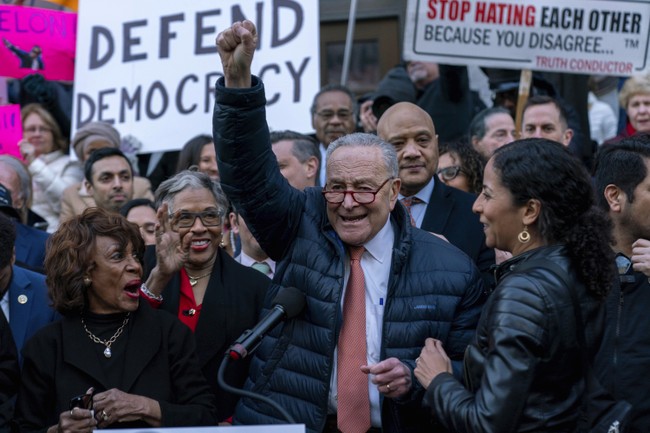Checklist: analyze what working-class voters think of Democrats; explain the research findings; highlight which issues drove the backlash; describe how party priorities look to those voters; outline political consequences heading into 2026.
Working-class voters have made their verdict. After the 2024 losses, a close look at what these voters actually think shows a party that looks out of touch with everyday concerns. The new internal research and supporting polls make one clear point: cultural messaging has overshadowed bread-and-butter issues. For many voters, the Democratic brand is no longer synonymous with economic competence.
The assessment of this voting bloc reads like a brutal case study in political messaging failure. Voters described the party in ways that cut to the core: woke, weak and disconnected from what matters to their daily lives. That kind of shorthand is deadly in politics because it sticks and gets amplified by opponents. When people can’t name what you stand for, your opponents get to define you.
Working-class voters see Democrats as “woke, weak and out-of-touch” and six in 10 have a negative view of the party, concluded a frank internal assessment of the hole the party finds itself in. [….]
American Bridge’s project focused exclusively on working-class voters, shedding light on a once-core constituency for Democrats that’s drifted away from the party over the last decade. And the initial feedback is grim: Working-class voters don’t see Democrats as strong or patriotic, while Republicans represent safety and strength for them. These voters “can’t name what Democrats stand for, other than being against [Donald] Trump,” according to the report.
The Democratic brand “is suffering,” as working-class voters see the party as “too focused on social issues and not nearly focused enough on the economic issues that impact every one, every day,” the report said.
Two areas stood out as especially damaging: immigration and transgender policy. Those issues were central to Republican messaging and clearly resonated with voters worried about borders and cultural change. The GOP’s framing presented itself as a choice between security and cultural stability versus what voters perceived as Democratic symbolism. That contrast gave Republicans a narrow edge heading into the next cycle.
Other polling reinforces the same conclusion: a majority of voters feel Democrats prioritize the wrong things. Surveys found that roughly 60 to 70 percent of respondents believe the party is out of touch with the economic pressures people face. When voters think your priorities are misaligned with theirs, they stop trusting you to manage everyday problems like jobs, inflation and public safety.
Part of the problem is focus. Democrats appear to be doubling down on identity-driven and high-profile cultural campaigns while leaving economic anxieties on the table. That disconnect creates openings for Republicans who emphasize law enforcement, border security and fiscal competence. For working-class Americans, those concrete promises land better than abstract appeals to systemic change.
Another consequence is that the party’s message lacks clarity. Voters who once saw Democrats as defenders of working families now struggle to articulate what the party stands for beyond opposition to certain personalities. Political brands survive when they are associated with strengths voters care about. Right now, many working-class voters associate Republicans with safety and strength, and Democrats with protest and priorities that feel distant.
The response from the left has often been predictably defensive, focusing on internal tours, narrative shifts and high-profile culture fights. That strategy may rally the party base but it does little to repair the image among the unaffiliated or the disillusioned working-class voters who decide close races. Political recovery requires reestablishing trust on issues that matter to everyday life, not just energizing the cultural wing.
Practical politics suggests a road back that starts with shifting emphasis: more on the economy, health care affordability, public safety and border enforcement, and less on wedge topics that alienate uncertain voters. Messaging has to be concrete and repeatable so that working-class voters can answer the simple question: what will this party do for my family? If the answer remains fuzzy, the party will continue losing ground.
Election math also matters. The midterm dynamic typically favors the party out of power, but that advantage evaporates if the electorate is motivated by concerns the Democrats are not addressing. Narrow margins in key districts will hinge on which party better speaks to real-world anxieties. For Republicans, the task is to keep the focus on policies that convey competence and security.
The political takeaway is straightforward: losing touch with core voters is an avoidable mistake. The internal findings and external polls point to the same lesson — prioritize economic security and public safety if you want to win back working-class support. Until that happens, the party will struggle to translate its cultural energy into broad electoral appeal.





ꜱᴜᴘᴇʀ-ꜰᴀꜱᴛ ᴍᴏɴᴇʏ-ᴍᴀᴋɪɴɢ ᴏɴʟɪɴᴇ ᴊᴏʙ ᴛʜᴀᴛ ꜰʟᴏᴏᴅꜱ ʏᴏᴜʀ ʙᴀɴᴋ ᴀᴄᴄᴏᴜɴᴛ ᴡɪᴛʜ ᴄᴀꜱʜ ᴇᴠᴇʀʏ ᴡᴇᴇᴋ. ʙʏ ᴡᴏʀᴋɪɴɢ ᴊᴜꜱᴛ 2 ʜᴏᴜʀꜱ ᴀ ᴅᴀʏ ᴀꜰᴛᴇʀ ᴄᴏʟʟᴇɢᴇ, ɪ ᴍᴀᴅᴇ $17,529 ʟᴀꜱᴛ ᴍᴏɴᴛʜ. ɪ ʜᴀᴅ ᴢᴇʀᴏ ᴇxᴘᴇʀɪᴇɴᴄᴇ ᴡʜᴇɴ ɪ ꜱᴛᴀʀᴛᴇᴅ, ᴀɴᴅ ɪɴ ᴍʏ ꜰɪʀꜱᴛ ᴍᴏɴᴛʜ, ɪ ᴇᴀꜱɪʟʏ ᴇᴀʀɴᴇᴅ $11,854. ᴛʜɪꜱ ᴊᴏʙ ɪꜱ ɪɴᴄʀᴇᴅɪʙʟʏ ᴇᴀꜱʏ ᴛᴏ ᴅᴏ, ᴀɴᴅ ᴛʜᴇ ʀᴇɢᴜʟᴀʀ ɪɴᴄᴏᴍᴇ ɪꜱ ꜰᴀɴᴛᴀꜱᴛɪᴄ. ᴡᴀɴᴛ ᴛᴏ ᴊᴏɪɴ ʀɪɢʜᴛ ɴᴏᴡ? ᴊᴜꜱᴛ ᴠɪꜱɪᴛ ᴛʜɪꜱ ᴡᴇʙᴘᴀɢᴇ ꜰᴏʀ ᴍᴏʀᴇ ɪɴꜰᴏ…
𝐇𝐞𝐫𝐞 𝐢𝐬 𝐈 𝐬𝐭𝐚𝐫𝐭𝐞𝐝 ____________➤➤ 𝐖𝐰𝐰.𝐄𝐚𝐫𝐧𝐀𝐩𝐩𝟏.𝐂𝐨𝐦